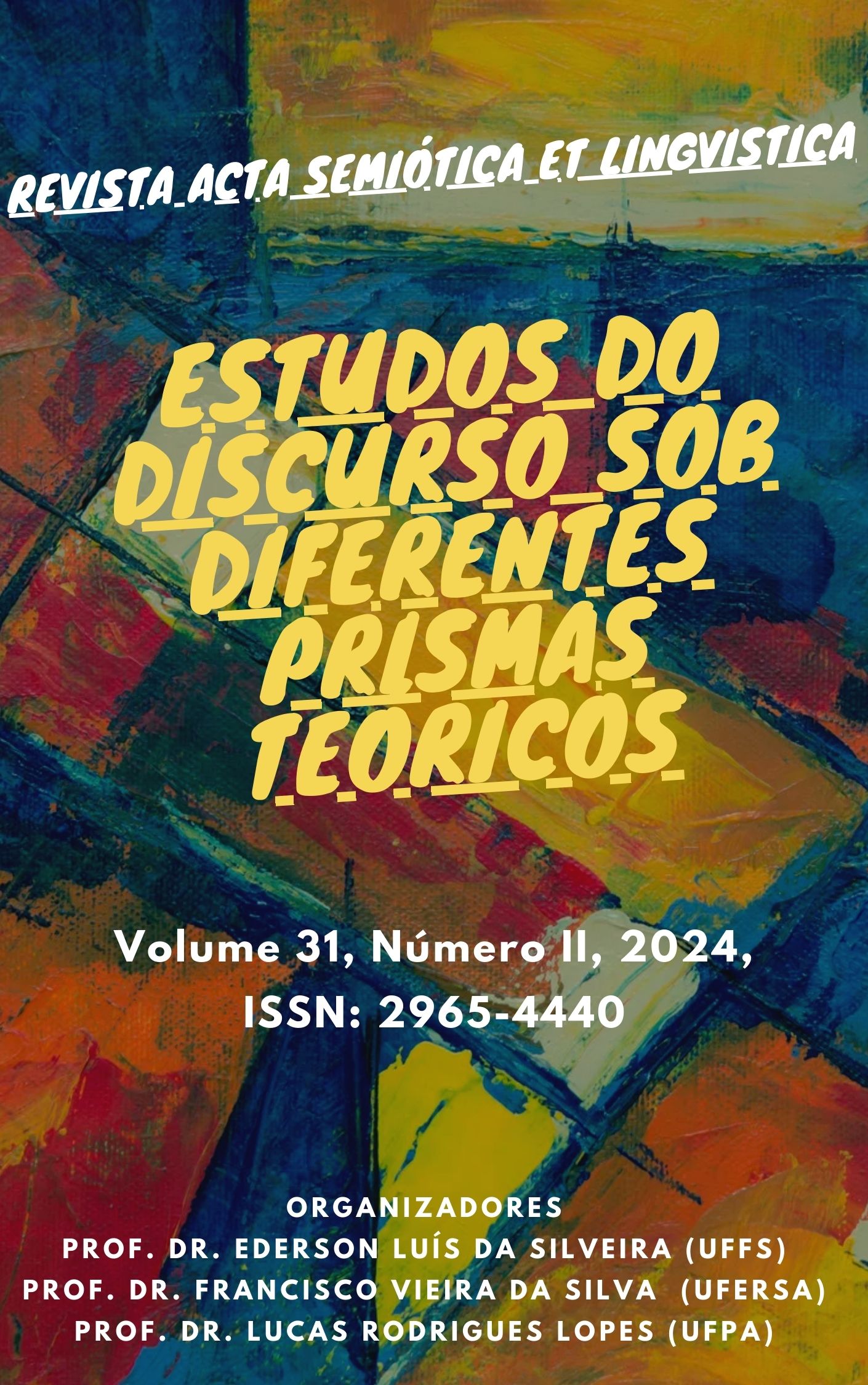A FORMAÇÃO DO CONCEITO JURÍDICO DE FAMÍLIA
UMA ANÁLISE ARQUEOLÓGICA
DOI:
https://doi.org/10.20873/actasemiticaetlingvistica.v31i2.20279Keywords:
Discurso, Conceito jurídico de família, Relações de poder, ArqueologiaAbstract
Through an archaeological study, this article aims to investigate the formation of family’s concept, in legal discourses. To this end, it used Foucaultian discursive studies as its theoretical and methodological basis. We focus specifically on the categories of statement, discourse, discursive formation, will to truth, and governmentality, to analyze how the discursive object family is constructed in two discursive practices: that of the Supreme Federal Court (STF) ruling and that of Bill No. 5167/2009, which promote the legal concept of family from different perspectives. Methodologically, the approach adopted in research the characterized as qualitative and interpretative nature (Laville; Dionne, 1999). The result of the analyzes points to the construction of will truth through two antagonistic views that highlight how the relations of knowledge and power in a discursive dispute are decisive for the archaeological description of these discursive formations in what involves the formation of objects, concepts, enunciative modalities and strategies in the construction of discursive objects and the concepts of legal institutes, which govern the lives of subjects in society.
References
ALMEIDA, J. P. M. de. “Deus, pátria, família”: os sentidos do fascismo brasileiro. RUA, Campinas, v. 28, n. 2, p. 353–376, 2022. DOI: 10.20396/ rua.v28i2 .8671122. Disponível em: https://periodicos.sbu.unicamp.br/ojs/index. php/rua/ article/view/8671122. Acesso em: 11 ago. 2024.
BRASIL. Código de processo civil. Lei nº 13.105, de 16 de março de 2015. Disponível em: <https://www.planalto.gov.br/ccivil_03/_ato2015-2018/2015/lei/l13105.htm>. Acesso em: 09 de março de 2024.
BRASIL. Código Civil. Lei nº 10.406, de 10 de janeiro de 2002. Disponível em: <https://www.planalto.gov.br/ccivil_03/leis/2002/l10406compilada.htm>. Acesso em: 09 de março de 2024.
BRASIL. Constituição Federal, de 05 de outubro de 1988. Disponível em: https://www.planalto.gov.br/ccivil_03/constituicao/constituicao.htm. Acesso em: 11 de março de 2024.
BRASIL. Lei nº 9.868, de 10 de novembro de 1999. Disponível em: <https://www.planalto.gov.br/ccivil_03/leis/l9868.htm#:~:text=LEI%20No%209.868%2C%20DE%2010%20DE%20NOVEMBRO%20DE%201999.&text=Disp%C3%B5e%20sobre%20o%20processo%20e,perante%20o%20Supremo%20Tribunal%20Federal.>. Acesso em: 09 de março de 2024.
BRASIL. Propostas de juristas para modernizar a legislação. Agência Senado: lhttps://www12.senado.leg.br/noticias/infomaterias/2024/04/codigo-civil-conheca-as-propostas-de-juristas-para-modernizar-a-legislacao. Acesso em: 22 de junho de 2024.
BRASIL. Supremo Tribunal Federal (Plenário). ADPF nº 132-RJ. Acórão. UNIÃO HOMOAFETIVA E SEU RECONHECIMENTO COMO INSTITUTO JURÍDICO. Relator: Min. Ayres Brito, 14.10.2011. Disponível em: https://redir.stf.jus.br/paginadorpub/paginador.jsp?docTP=AC&docID=628633. Acesso em: 09 de março de 2024.
CANOTILHO, J. J. G. Direito constitucional e teoria da constituição. 3. ed. Coimbra: Almedina, 1998.
FOUCAULT, M. Microfísica do poder. Rio de Janeiro: Edições Graal, 1979.
FOUCAULT, M. A Arqueologia do Saber. Rio de Janeiro: Forense Universitária, 2008.
FOUCAULT, M. A ordem do discurso: aula inaugural no Collège de France, pronunciada em 2 de dezembro de 1970. São Paulo: Edições Loyola, 2014.
FOUCAULT, M. Poder e Saber. In: MOTTA, Manuel Barros da (org.). Estratégia, poder-saber. 3. ed. Coleção Ditos & Escritos, Rio de Janeiro: Forense Universitária, 2015.
LENZA, P. Direito constitucional esquematizado. 16. ed. São Paulo: Saraiva, 2012.
MACHADO, R. Introdução: Por uma Genealogia do poder. In: FOUCAULT, Michel. Microfísica do poder. Rio de Janeiro: Edições Graal, 1979
NADER, P. Introdução ao Estudo do Direito. Rio de Janeiro. Forense, 2013.
REALE, M. Teoria Tridimensional do Direito. 5. ed. São Paulo: Saraiva, 1994.
REALE, M. Filosofia do direito. São Paulo: Saraiva, 2002.







